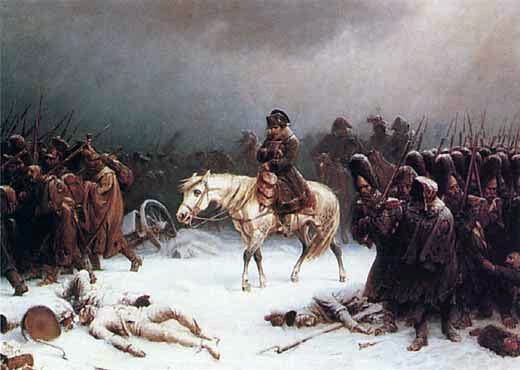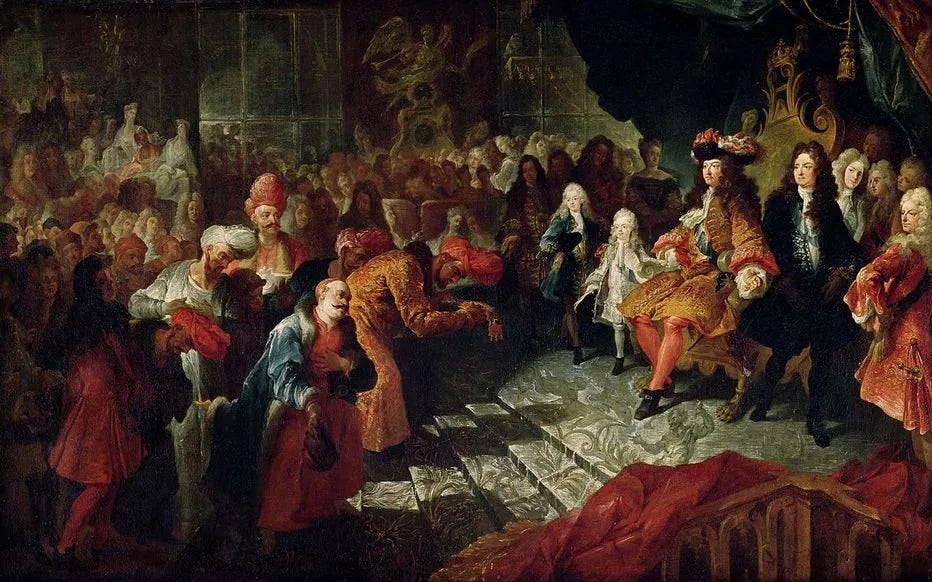What did Napoleon do wrong?
In June 1812, Napoleon crossed the border of Russia with the largest and strongest army in the history of mankind. In just a few months, he escaped with merely a handful of survivors, the rest of his Grande Armee lying in the fields and forests, and swamps. This may be the most spectacular, the most incredible military defeat in all of the recorded history, especially in the light of the fact that it was suffered by the universally recognised military genius, and the greatest general in Europe.
Russia did not have military talents of Napoleon’s calibre, nor did it claim to have. Nor were the Russian commanders anywhere comparable with the commanders of the victorious Napoleonic army that had just brought the entire Europe under its heels. Russian generals were worse. Russian officers were worse. The whole military structure of Russia was dumber, coarser, more primitive, less agile. The French army showed a clear qualitative superiority in every single engagement of the war, until almost the very end.
Still, it was the French army that was smote, and reduced to nothing, and gone with the wind. And it was the French Empire that was shattered to pieces, while the Russian Empire reached its peak of power and prestige on the European scene.
So how did it all happen?
***
First thing we need to understand about war is that the wars are never fought for military purposes.
They are fought for the political purposes only.
So, what kind of political purpose did Napoleon pursue when launching his invasion of Russia?
(That is the single crucial element for understanding the failure of his military campaign)
To put it in simple terms, he wanted to integrate the Russian Tsar Alexander into the Napoleonic political order and Europe, and integrate him as a junior, inferior partner. Setting all the politeness and political correctness aside, he wanted to have the Russian Tsar as his vassal king.
Let me give you an illustration that may be conveying my point better than just an abstract theorising.
The peak and the greatest show of Napoleon’s power was the levee he gave in Dresden, just before the start of invasion
Now what was levee?
It was a detailed and elaborate ceremony that Napoleonic court inherited from the French Kings. Since the times of Louis XIV, the Bourbon kings of France held a public ritual centered around the rise and the dressing of the reigning monarch. Dukes, princes, bishops, all sorts of noblemen and the officials saw it as a great honour to be present at the daily morning ritual, and the closer they were allowed to the body of the monarch (which was along the source of all honour), the better it was, and the more prestigious for them.
Now here is a nuance that I want to draw a special attention to. Being present at the daily rituals in Versailles was an honour, of course, but it came at a cost. And the cost was - not being present at home. You see, all these sorts of noblemen and prelates drawn to the royal court used to be regional elites, once. They used to be great and powerful noblemen controlling situation on the ground, all over the provinces of France; in Normandy, in Burgundy, in Provence. Living in their grand manors, commanding obedience (and loyalty!) of the locals, maintaining the armed retinue of their own, they always remained a source of the potential political and military danger to the French crown. And so, the Crown decided to deal away with this danger, drawing them all to court, and locking in golden cage, at the foot of the royal throne.
Disempowered, emaciated, entrapped, the nobility of France served as some kind of glorified cheerleaders, providing the king with the ready audience, so that he could better shine in the rays of everyone’s attention. The true, and actual power of the French aristocracy, meanwhile, was eroding, slowly and invisibly.
Now that was the model Napoleon was scaling up, now on the pan-European scale
Under the royal power, Paris used to be the capital of France, and only. Under the power of the emperor, Paris was to become the capital of Europe, and of the entire world. The kings and monarchs of Europe were to come to Paris, pay their homage, attend all the ceremonies at the imperial court and play the role that dukes and barons of France were playing at the court of the Bourbon king.
“The French Empire shall become the metropolis of all other sovereignties. I want to force every king in Europe to build a large palace for his use in Paris. When an Emperor of the French is crowned, these kings shall come to Paris, and they shall adorn that imposing ceremony with their presence and salute it with their homage”
(Adam Zamoyski. 1812: Napoleon’s Fatal March on Moscow)
Pay special attention to the word “force”. Attendance at the imperial court was not really optional. It was supposed to be compulsory. The kings of Europe were to come Paris, and would be obliged to participate in ceremonies, like the one Napoleon set in Dresden just in about a month before his invasion of Russia:
“Napoleon had taken up residence in the royal palace, which Frederick Augustus had obligingly vacated... It was he who was the host, and he dictated etiquette, treating both the King of Saxony and the Emperor of Austria as his guests. At nine every morning he would hold his lever, which was the greatest display of power Europe had seen for centuries. It was attended by the Austrian Emperor and all the German kings and princes, ‘whose deference for Napoleon went far beyond anything one could imagine’, in the words of Boniface de Castellane, a twenty-four-year-old aide-de-camp. He would then lead them in to assist at the toilette of Marie-Louise [= his wife].
In the evening they would dine at Napoleon’s table, off the silver-gilt dinner service Marie-Louise had been given as a wedding present by the city of Paris, and which she had thoughtfully brought along. The company would assemble and enter the drawing room in reverse order of seniority, each announced by a crier, beginning with mere excellencies, going on to the various ducal and royal highnesses, and culminating with their imperial highnesses the Emperor and Empress of Austria. A while later, the doors would swing open and Napoleon would stride in, with just one word of announcement: ‘The Emperor!’ He was also the only one present who kept his hat on.
This were by no means just gratuitous show, but part of a carefully choreographed display of power. ‘Napoleon was indeed God at Dresden, the king amongst kings,’ was how one observer saw the proceedings. ‘It was, in all probability, the highest point of his glory: he could have held on to it, but to surpass it seemed impossible.’ ”
(Ibid)
All the monarchs, all the rulers all the upper aristocracy in Europe assembled there to greet their supreme suzerain. Like the French aristocrats attending the court in Versailles to greet their king, so did the monarchs of Europe attend the court in Dresden to greet their emperor. Fundamentally, Napoleonic system was the royal system of France scaled up.
Now the thing with Napoleon, is that he wanted to add the Russian Alexander into this scheme
BUT
there was a problem
Keep reading with a 7-day free trial
Subscribe to kamilkazani to keep reading this post and get 7 days of free access to the full post archives.


